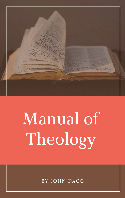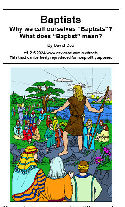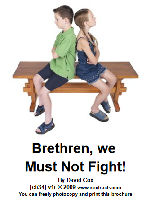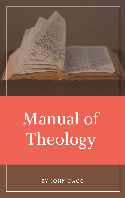Ads
This post and the other posts here are taken from my book in Spanish “False Prophets and Teachers”
Here I am just going to list each of the points, and gradually, I will make a separate post for each of these points. Note that a lot of the points here are themes that I take up regularly in my writings against false prophets. Some of those things will also appear under each point.
1Pet 5:8 Be sober, be vigilant; because your adversary the devil, as a roaring lion, walketh about, seeking whom he may devour:
Eph 6:12 For we wrestle not against flesh and blood, but against principalities, against powers, against the rulers of the darkness of this world, against spiritual wickedness in high places.
Everything Satan touches leaves “his mark” on it. This is very distinctive. It is not the will of God, although Satan tries to make it look like what God does, and look like the will of God.
Definition: False Prophet – Somebody who perverts, twists, or manipulates the message of God for his own personal purposes. In this, he does not give the message of God such as God gives and commands us to give it, but he puts his own “touch” on it slightly or greatly changing it. (David Cox)
2Pet 1:21 For the prophecy came not in old time by the will of man: but holy men of God spake [as they were] moved by the Holy Ghost.
God has to be behind every true presentation of truth and the gospel, and Satan perverts or changes it for his own purposes. What those purposes may be is not so important as that it is not God’s will.
1Pet 1:10 Of which salvation the prophets have enquired and searched diligently, who prophesied of the grace [that should come] unto you: 1Pet 1:11 Searching what, or what manner of time the Spirit of Christ which was in them did signify, when it testified beforehand the sufferings of Christ, and the glory that should follow. 1Pet 1:12 Unto whom it was revealed, that not unto themselves, but unto us they did minister the things, which are now reported unto you by them that have preached the gospel unto you with the Holy Ghost sent down from heaven; which things the angels desire to look into.
One of the great overpowering elements of a true minister of God is that they feel a great compulsion to be exact and in agreement completely with what God’s Word says. Over and over again we find this great respect for authority is the core difference between a true man of God and a false prophet.
1Pet 3:15 But sanctify the Lord God in your hearts: and be ready always to give an answer to every man that asketh you a reason of the hope that is in you with meekness and fear:
Col 4:6 Let your speech be alway with grace, seasoned with salt, that ye may know how ye ought to answer every man.
For a true man of God, the Word of God validates or convicts his ministry and message. He falls or stands by how well he stands with and presents the Word of God, Scripture. It is as if every encounter that the man of God has with another person, he will give account to God for that encounter. He must present in action, attitude, and speech correctly what God wants him to show that person. As a minister of the Gospel, he understands that he personally is an example of Jesus Christ (1Pet 5:3 “being ensamples to the flock“; Heb 13:7 “which have the rule over you… whose faith follow, considering the end of their conversation“). No true minister of God will take any of this lightly. False prophets often give a pretense of being serious, but so often they are not really serious in obeying or uplighting this great office of spokesman for God.
Note: If something shows up as a link here, the connection may not be obvious in the title, but a section of that post will deal with the issue.
We can identify a false prophet by…
I. By their Fruit – What they do or produce by their life and ministry
Contents
- 1 1. The fruit of their doctrine is bad.
- 2 2. They don’t do God’s will.
- 3 3. They promote the worship of other gods or other doctrines.
- 4 4. They disobey biblical restrictions and instructions.
- 5 5. They preach things that don’t result in piety nor spiritual maturity and strength, but rather vanity.
- 6 1. They tend to excessively control (enslave) the brethren.
- 7 2. They illicitly take money from the brethren.
- 8 3. They sacrifice the sheep, and they don’t sacrifice themselves for the sheep.
- 9 4. They have a tendency towards being cruel and harsh.
- 10 5. They don’t have integrity.
- 11 6. They fabricate their own vision that is not of God.
- 12 7. They deceive by “doing” miracles as a means of gaining authority over the people of God.
- 13 8. They have a tendency towards not confronting sin, especially when that sin is in their own lives, or in the privileged among their own people.
- 14 9. They reject, despise, hate, and denounce true authorities.
- 15 10. They tend to exaggerate (lie).
- 16 11. They make an exception of persons to benefit their own person or ministry. (They play favorites)
- 17 12. They want to praise men and recognize them.
- 18 13. They are heretical (cause divisions over unity in doctrine).
- 19 1. They want to appear as tremendous Christians, but inwardly, they are ravening wolves.
- 20 2. They have a tendency to be proud and arrogant.
- 21 3. They side-step the standards of God for themselves.
- 22 4. They are murmurers.
- 23 5. They are contentious.
- 24 6. They are mockers.
- 25 7. They are sensual, without the Holy Spirit.
- 26 8. They are blasphemers, attacking the person of others.
- 27 9. They are people without any real rules (unlawful), without principles, without integrity.
1. The fruit of their doctrine is bad.
God has installed a rule of law in that doctrine and practice are highly intertwined one with the other. Real Bible doctrine directs belief to ahat God has established, positively in righteousness, and negatively in not sinning (disobeying God’s will). Bad doctrine cannot produce good practice. Bad practice comes because there are flaws in the correct understanding of God’s doctrine.
Whether the false prophet actually knows the truth and turns from it (he is a hidden apostate), or whether he is self-deceived because he has not studied Scripture or does not understand Scripture, it doesn’t matter. The dynamic between practice and doctrine is energetic, and a person honestly following Bible instruction will seek to establish the belief system behind that practice, Also a person who understands and believes true Bible doctrine will always obey it, and therefore holding firm to one or the other will force you doctrine or practice to correct itself. When there is a willful rejection of either doctrine (think norms and standards as well as objectives) or the practice that flows from that doctrine, then we have a false prophet.
2. They don’t do God’s will.
A servant of God, a man of God, is a person who puts himself willingly at the disposition of God to do the work of God, how and when God wants it done. A false prophet is no servant of God. He only serves his own desires and purposes, which is essentially is a kind of narcissism, or worship of one’s own self, his will, his desires, his pleasures over anything else including God.
3. They promote the worship of other gods or other doctrines.
4. They disobey biblical restrictions and instructions.
Out right rejection of God’s norms and standards, as well as duplicity, holding one standard for others, and a more beneficial standard (usually easier) for their own self, or themselves and the leaders or their favorites.
5. They preach things that don’t result in piety nor spiritual maturity and strength, but rather vanity.
The false prophet is usually a charismatic type of person that has a personality that attracts others to him. He is a used car salesman, or a circus huckster, calling others to himself with tidbits of interesting things, and in general is an easy-to-get-along-with, except if you don’t want to do what he says, or don’t want to open your wallet to him. But the false prophet has a tendency to focus on things in a way that makes people think they have got something real when they don’t, cotton candy preaching.
The net end result is that people are not really like Jesus Christ at all. They may show a kind of courtesy one to another that looks like Christianity, but there is no real love there. The fruit of correct doctrine and obedience over a period of time is holiness, piety, and the filling of the Holy Spirit. Aggression is always and only directed towards Satan, Satan’s devices, sin, and those that promote Satan’s agenda. People who disagree with a pious Christian do not cause anger or aggression from that Christian. He is magnanamous in giving others the right to disagree with him. Satan’s people rarely will allow any dissent with their views.
II. By their methods – How they do what they do.
1. They tend to excessively control (enslave) the brethren.
They have a tendency towards being dictators. There is a fine line between leading a group to do a job, and being a dictator. Dictators have only one will, their own. Leaders point the group in the right direction and talk about methods, but they empower and motivate their own people to actually do the work, leading by their own example instead of pushing via their own authority (dictatorship).
2. They illicitly take money from the brethren.
3. They sacrifice the sheep, and they don’t sacrifice themselves for the sheep.
False prophets are abusive towards the brethren. They see the brethren as a product to harvest for their own needs. They only tend to the needs of the product in so much as it is necessary for them to produce at an optimum. Sexual abuses are just normal for a false prophet. A true man of God refuses to abuse of his charge. He holds the brethren as a higher need than any of his own needs. He is not a “day laborer” in the Lord’s vineyard, but somebody responsible, wholly dedicated to serving the needs of his charge over himself.
4. They have a tendency towards being cruel and harsh.
The Bible casts the light on the redeemed as a family community in which love one for another is the common base. We all love Jesus, and loving Jesus, being saved, means that we also love one another.
When people are cruel and harsh then that reveals a bad heart. Sometimes a person has to be cruel and harsh. As a pastor, I have found myself in those shoes on a rare occasion. But always the reason is because people will not be reasonable nor open minded in receiving exhortations and spiritual direction. That hardness means they will only respond to hard things.
5. They don’t have integrity.
Integrity is wholesomeness. Being complete or whole. It means that they will be fair and honest and upfront with others. That is their trait. False prophets regularly deceive and that is their preferred way of doing things.
6. They fabricate their own vision that is not of God.
These false prophets are experts at spinning things so that what they ultimately want is presented as the will of God. A vision is something that is a plan of work. God has given us a plan for doing the work of God, and that is through local churches. But every religious group seems to see a local church as the last thing they are pushing. They have projects, methods, ways of reaching people, etc. but simply evangelizing the lost where they are, and directing them into a local church to unite with the work of God (evangelizing and discipling through a church). This is the problem with abandoning God’s plan, and replacing it with your own vision.
This point dovetails with enslaving the brethren by being a dictator. What they ultimately want is a group of highly dedicated and sacrifical people to worship his own self, the preacher that is. They use means to leverage authority over them, so that the preacher’s word is final, and having said that, they proclaim that “that is Bible!”
8. They have a tendency towards not confronting sin, especially when that sin is in their own lives, or in the privileged among their own people.
From what I have seen in my own experiences, a false prophet will always tend to avoid confrontation over sin. He wants economic gain from his dealings, and there is nothing economically good about rebuking people for their sins. They tend to 1) no tithe, 2) no attend, 3) move to another church, 4) not respond to pleas from the pulpit, 4) talk bad about the ministry you are in.
So there is really no good that can come from rebuking sin, especially when the sin in particular is cherished among the people of your church. Some sin that nobody is anywhere near practicing is okay, but not common sins. If you step on enough toes in the church fellowship, they will kick you out. So a false prophet wants none of this.
Only a good pastor can see the eternal good of preaching against the sins of his people. They are right with God afterwards (we hope). That is worth the “risk” of offending people. Again, false prophets want to gain things for themselves from their “ministry”. Their heart is not in rebuking.
As an obedient Christian, we obey the authorities God has set over us. A good minister understands that and also understands the frailties and errors of those in authority.
A false prophet wants everyone else to obey his authority, but he doesn’t want to recognize his own obligations before God.
10. They tend to exaggerate (lie).
Truth is a mainstay for the believer. We seek truth. We want truth. Truth sets us free. But a false prophet “uses” truth for his own evil purposes. That is the main difference between a good pastor and a false prophet.
11. They make an exception of persons to benefit their own person or ministry. (They play favorites)
False prophets are constantly “playing” the people in his ministry. He wants to make a ladder from nowhere to “him”. Being in his good favor. They do this by using people’s willingness to sacrifice and work for the work of God. He uses that in order to get his own benefit, not necessarily the benefit of the work of God.
This is essentially taking into consideration what good things a person can do for you personally, and then using mercy very judiciously or very stingily depending on that person’s potential to benefit you (he will say, benefit “the work of God”).
12. They want to praise men and recognize them.
This is perhaps the saddest element. A false prophet has no hope for eternity. He is only working on gaining for his own self things that are between now and his death. After death, he expects nothing, nothing from the Lord for what he is doing. He is deceiving himself as to any hopes of eternal rewards if he even talks of them.
So the here and now are what controls his mindset and decisions, actions. He wants men to praise him, and he wants economic benefits.
13. They are heretical (cause divisions over unity in doctrine).
False prophets build a temporal work similar to a church to themselves, and they do that not by having good doctrine and practice, but by stealing people from other works. That is the way they work.
Many times there are good Christians in their churches, and they do win souls to Christ. But the false prophet himself is not going to be fighting and striving to do that. He is only concerned about “showing” himself to his people so that they will sacrifice for “the work”.
Heresies are issues of doctrine or practice that divide. They are not biblical. Biblical doctrines and practices unity and cause hopes to be bound together. Heresies are prideful things that give pride to those who hold them. Only they see the truth.
III. By their character – what they are morally, what is in their heart.
1. They want to appear as tremendous Christians, but inwardly, they are ravening wolves.
Since their basis is personal economic gain and a constant building of the outward elements of ministerial success, they are gran consumers. They build big buildings and spend tremendous sums of money on “their vision” of the work of God.
Notice that while they constantly play the tune of personal sacrifice, rarely will they ever personally sacrifice except when it can be used as a Public Relations event to show how devoted he personally is.
2. They have a tendency to be proud and arrogant.
A false prophet has a hard time understanding how Christ could be so humble and meek. They look on that with despite. Personally, they are not following THAT PICTURE OF CHRIST.
They boast of what they personally have done, and they boast of what their people have done through him.
3. They side-step the standards of God for themselves.
Mentioning their aversion to humility, the false prophet will preach pretty little sermons on the standards of God, but they themselves are exempt from any personal obligation to abide by them. They will never tell you that, but it will come across with time.
4. They are murmurers.
A false prophet uses anything and everything he can to build what is his idea of the work of God. Complaining about what is not right is a common resort for these kinds of people. Instead of building a picture of what is right according to God’s will, using exposition of Bible verses, they focus on tearing down things.
5. They are contentious.
A general characteristic of a false prophet is that they are contentious. That is, they are given over to fighting. But again, not fighting for what is right, but what is their right. What is the work of God under their control.
If you see how reasonable a man can be in resolving conflicts, you will see if he is contentious or not. When there are options on the table to resolve without a public fight, how willing are they to go those routes? Those options are not always right either, but you see a general trend of loving a good fight in a contentious man.
6. They are mockers.
We do not understand the concept of mocking. It is basically comedy. When we see a person get up and speak and makes fun of others, of a class of people, or even of their own selves, then you are watching a mocker.
False prophets will use ridicule and scorn against those who he deems as a point of opposition in their plans.
7. They are sensual, without the Holy Spirit.
A good Christian is one who is sensitive to the Holy Spirit. They constantly analyze their actions and speech to see if it pleases God, and many times, no matter whether they stopped themselves or not, their questioning of their own lives shows an active Holy Spirit in their thought life.
8. They are blasphemers, attacking the person of others.
Every false prophet knows that there is nothing like a good enemy or whipping boy. They will regularly use some whipping boy to beat up the emotions of his own people so that they will go to extremes and sacrifice greatly.
9. They are people without any real rules (unlawful), without principles, without integrity.
Unlawful comes to mind here. These are people that direct their lives according to whatever best suits them at the moment. Often, they change their life principles in mid step because it is useful to them.
A good man of God doesn’t do things without studying what God has said about the things related to that issue. He moves forward on Bible exposition with a lot of prayer.

Dagg Manual of Theology (and links to this work in various other formats).
Dagg Manual of Theology (MySword for Android)
Dagg Manual of Theology (theWord Bible Format)
Dagg Manual of Theology (esword format)
Dagg Manual of Theology (PDF Format)







